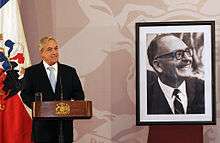Edmundo Pérez Zujovic

Edmundo Pérez Zujovic (May 11, 1912 - June 8, 1971) was a Chilean politician of the Christian Democrat Party. He was Minister of the Interior, Public Works and Finance under the government of President Eduardo Frei Montalva (1964–1970).
Pérez was born in Antofagasta. He was the father of the politician Edmundo Pérez Yoma, who is also a Christian Democrat.
Bloodshed in Puerto Montt
On March 9, 1969, a group of Chilean police attempted to remove a group of squatters at Puerto Montt, killing ten of them, in what has come to be called the "Massacre of Puerto Montt." As Minister of the Interior, Pérez had been consulted about what to do with the squatter camp. While no one knows if he ordered police to shoot, he did approve the removal of settlers from the illegal settlement, reversing his government's previous policy of squatter appeasement. It appears that he took this action because an opposition politician from the region, a leader of multiple squatter land-grabs, had recently been elected, thereby politicizing settlements in that area. Police had two encounters with settlers on that day. In the first one the police tear-gassed and stormed the camp, apparently without warning, after having given assurances to the contrary the previous day. The settlers subsequently returned in larger numbers and overwhelmed the police using crude weapons. The police then fired on the group.[1]
Outrage was enormous, even within the ruling Christian Democratic party.[1] The leftist opposition blamed Pérez Zujovic and Jorge Pérez Sánchez for the death of the squatters, but they were not brought to trial.
Chilean folk singer Víctor Jara wrote a song about the massacre entitled "Preguntas por Puerto Montt" ("Questions for Puerto Montt"), which mentions Perez Zujovic by name:
| Usted debe responder | You have to answer |
| señor Pérez Zujovic | Mr Pérez Zujovic |
| porqué al pueblo indefenso, | why was the defenseless people |
| contestaron con fusil. | answered with guns. |
| Señor Pérez su conciencia | Mr Pérez, your conscience -- |
| la enterró en un ataúd | you buried it in a coffin |
| y no limpiarán sus manos | and all the rains of the South |
| toda la lluvia del sur. | will not clean your hands.[2] |
On one occasion, Jara sang the song at Saint George's College in Santiago, unaware that one of Pérez Zujovic's sons was in the audience.[3]
Assassination
On June 8, 1971, Pérez was driving to his construction firm office in a Mercedes Benz, accompanied by his daughter, Maria Angelica, when his car was rammed by three men in another vehicle. Having brought Pérez’s car to a halt, one of the men smashed the window of the Mercedes and killed Pérez with a burst of submachine-gun fire.[4] Maria Angelica later identified the gunman as Ronald Rivera Calderon, a member of a leftist terrorist group called Organized Vanguard of the People.[5] On June 13, Ronald Rivera Calderon was killed by police in a gunfight at his hideout; his brother, Arturo, committed suicide, and seven others were arrested.[6]
Pérez’s assassination is thought to have exacerbated the deepening divide in Chilean politics which would eventually lead to the 1973 coup d'état.[7]
Homages

The name of Edmundo Pérez Zujovic is commemorated on many streets throughout Chile, including a heavily trafficked roundabout in the community of Vitacura in Santiago.
The Department of Science, Physics and Mathematics at the University of Chile instituted a grant program under his name in 1991.
References
- 1 2 Cleaves, Peter (1974). Bureaucratic Politics and Administration in Chile. University of California Press. pp. 295–298. ISBN 0-520-02448-6.
- ↑ "Preguntas Por Puerto Montt" (PDF). Archivo Chile. Retrieved July 17, 2013.
- ↑ "El rol del artista" (in Spanish). Fundación Victor jara. Retrieved June 20, 2015.
- ↑ "Ex-Official Killed By Chilean Gunmen". Palm Beach Post. June 9, 1971. p. A2.
- ↑ "Blame Laid To Allende In Slaying". Palm Beach Post. June 10, 1971. p. A11.
- ↑ "Assassination Felt Solved After Fight". Spokane Daily Chronicle. June 14, 1971. p. 2.
- ↑ Loveman, Brian (2000). Las Ardientes Cenizas Del Olvido: Vía Chilena de Reconciliación Política. p. 359.